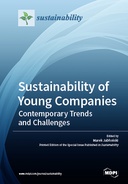Explore

Sustainability of Young Companies–Contemporary Trends and Challenges
Marek Jabłoński
2019
0 Ungluers have
Faved this Work
Login to Fave
Ensuring the sustainability of early stage companies and increasing awareness of the need for balancing targets against different stakeholder groups among young companies are not well developed. Young companies, in the first place, want to achieve financial success very often without regard for aspects such as the environment, positive relationships with employees, suppliers or other stakeholder groups, fulfilling requirements of labor law, etc. Another issue is that of companies whose business models are based on actuarially-preferred concepts, such as sharing economy, sustainable development, e-comers, e-commerce, renewable energy, social media, and others. A key issue is the resignation of companies from an approach to business, based on the foundations of classical economics to the sharing economy. Theory and practice seek new solutions in the sphere of value sharing in these new areas of sharing, and innovative forms of its implementation. Intriguing is the relationship of these business models with sustainability issues, as well as wondering how technology can influence sustainability. A contemporary approach to consumer value fits in with the assumption of a shared economy. It is interesting how it affects the assumptions of sustainability of business. The ongoing changes in the value system of potential consumers create new conditions for the design of sustainability business models and creation of innovation.
This book is included in DOAB.
Why read this book? Have your say.
You must be logged in to comment.
Rights Information
Are you the author or publisher of this work? If so, you can claim it as yours by registering as an Unglue.it rights holder.Downloads
This work has been downloaded 375 times via unglue.it ebook links.
- 192 - pdf (CC BY-NC-ND) at Unglue.it.
Keywords
- analytical hierarchy process
- business model
- China
- Corporate social responsibility
- coworking space
- creativity
- Data envelopment analysis
- digital economy
- Digitalization
- Efficiency
- entrepreneurship-specific human capital
- green human resource management
- incubation services
- incubator
- job performance
- Korea
- medical device industry
- medical device start-ups
- mutual support
- network involvement
- opportunity recognition and evaluation
- Performance Evaluation
- product innovation
- railway companies
- role breadth self-efficacy
- Social aspects
- social capital
- social climate
- social enterprise
- social enterprises
- social value
- socially responsible human resource management
- start-ups
- success factor
- sustainability development
- sustainable business model
- sustainable business model innovation
- sustainable enterprises
- tenants’ graduation
- value capture
- value creation
- value migration
- young companies
- young firms
Links
DOI: 10.3390/books978-3-03921-186-9Editions


